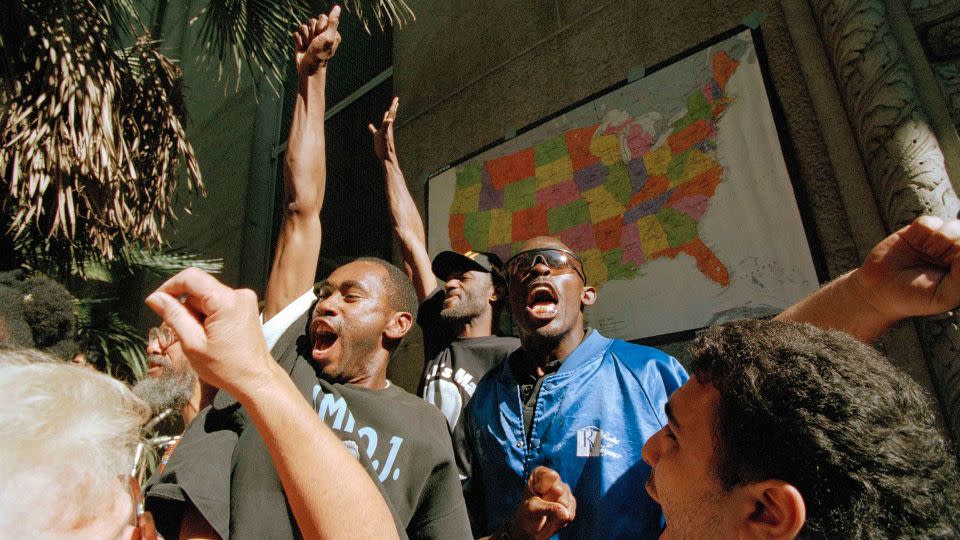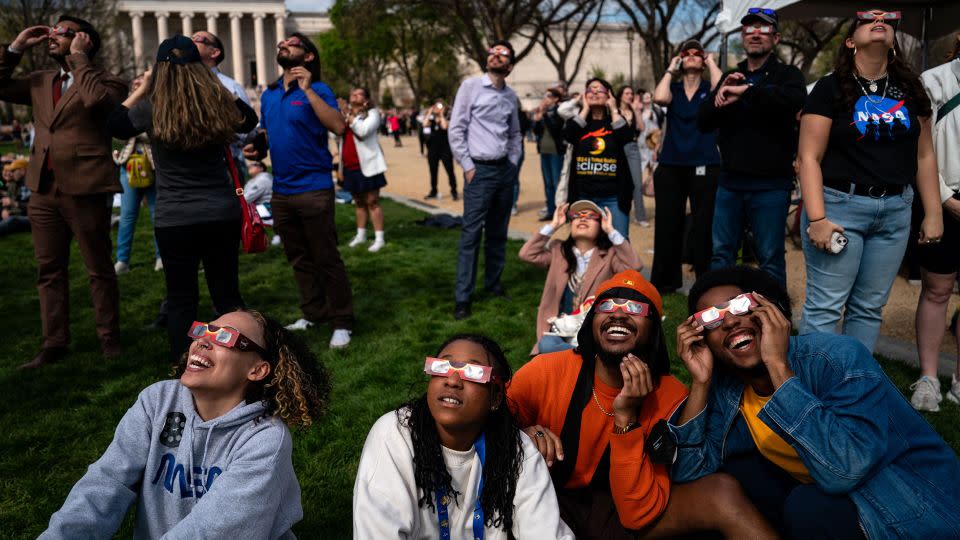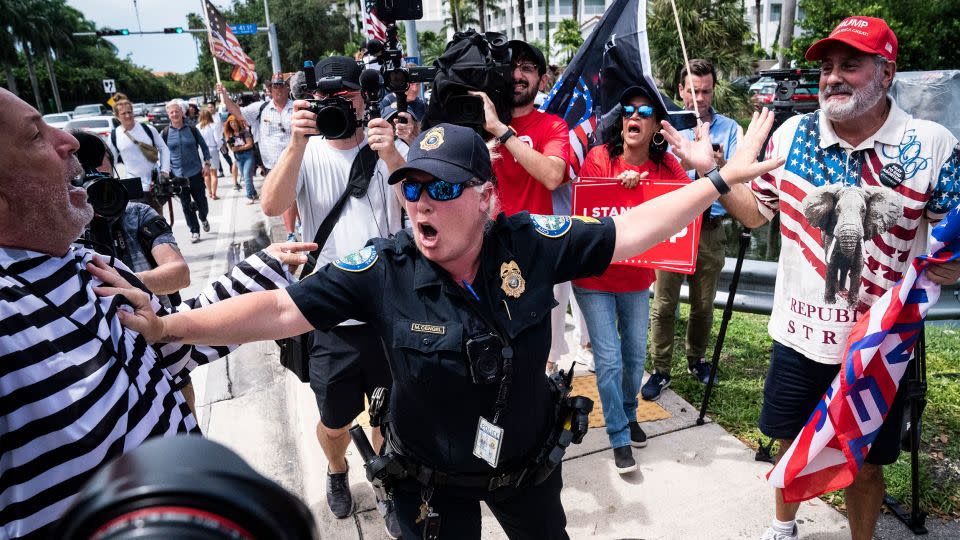O.J. Simpson gave us a preview of today’s America
For millions of Americans, it’s a moment they can’t forget.
On October 3, 1995, people gathered around TVs in living rooms, bars and workplaces to watch the verdict in the trial of O.J. Simpson, who had been charged with the grisly murders of his ex-wife Nicole Brown Simpson and her friend Ronald Goldman.
In the split second after the not guilty verdict was read, we saw White and non-White America rupture. Many Black Americans cheered, pumped their fists and exchanged high-fives, while many White Americans gasped in disbelief and anger.
When the news broke Thursday that Simpson had died at 76 from cancer, much of the immediate commentary focused on his past: His Hall of Fame NFL career; the surreal, slow-speed chase in his white Ford Bronco; the millions of Americans who were riveted by his televised trial for more than eight months, binge-watching before the term was even invented.
But Simpson’s death says something more about the present than the past in America — and that split-screen reaction to his verdict shows why.
What happened at his trial offered a sneak preview of the country we live in today.
Before there was fake news, there was fake DNA
For those who weren’t alive then, it’s hard to convey the impact of the verdict. It landed like a punch in the face. How could two groups of Americans watch the same event and absorb the same information but arrive at totally different conclusions?
Easily, it turns out. We do it all the time today, especially when it comes to race and politics.

White and non-White Americans live in increasingly separate worlds, unable to comprehend one another. The racial cleavage revealed by the 1995 verdict has now widened to a canyon.
Consider these diverging views of what’s supposed to be a common reality:
Some say January 6, 2021, was an insurrection sparked by a racist demagogue. Others say it was a legitimate political protest led by patriots.
Some say racism remains a pervasive problem for many non-White Americans. Others say White Americans are the primary victims of discrimination.
Some say America is a nation of immigrants who bolster the economy and reinvigorate the country. Others say non-White immigrants bring crime and are “poisoning the blood of our nation.”
If there is a phrase that captures this dueling version of America, it may be “alternative facts.”
Remember that phrase? It entered the American lexicon in 2017 during an exchange between Kellyanne Conway, then a senior adviser to President Donald Trump, and a NBC journalist. When the interviewer pressed Conway on a false White House claim about Trump’s inauguration drawing the largest crowd ever, she responded that press secretary Sean Spicer had given “alternative facts.”
But 20 years before Conway coined the term, Simpson’s trial had already revealed the potency behind such reasoning. No matter how much overwhelming evidence you have on your side, there are always “alternative facts.”
The prosecution in the Simpson murder trial thought their case was a slam dunk, with strong forensic evidence tying Simpson to the killings. It didn’t matter. There were alternative facts. Before there was fake news, there was fake DNA.
What started in that Los Angeles courtroom has now spread throughout America’s political and pop culture — seeing isn’t believing anymore. Is that video real or a deepfake? Did that student write that term paper, or was it generated by AI? Is that a person friending you on social media, or a bot?
Simpson gave us a preview of an America in which it’s becoming harder for anyone to believe their eyes or ears.
It’s no wonder that so many people followed the news of this week’s solar eclipse. It was a rare communal experience where millions of Americans witnessed the same event and few (though not all) talked about alternative facts.

Politicians have adopted the Simpson trial playbook
There was a surreal moment during the Simpson trial that could have been easily missed. After the acquittal, the jurors were filing out of the courtroom when one, a Black man, stopped and gave Simpson a Black Power salute — the raised fist symbolizing defiance and Black pride.
To anyone who had followed Simpson’s career, that moment was laced with irony.
Critics say Simpson spent years running away from his Blackness with as much vigor as he eluded NFL defenders. He cultivated a nonthreatening public persona that wouldn’t make White people nervous and refused to take controversial stands on racial issues. Friends quoted Simpson as once saying, “I’m not Black, I’m O.J.”
During the murder trial, though, Simpson and his team of lawyers deployed a legal strategy that has now infiltrated American politics.
They cast him as the victim of a vast conspiracy hatched by unsavory characters in the justice system. They highlighted racist epithets that an LAPD detective investigating the Simpson murder had once used during a taped interview. They hinted at personal biases held by judges and attorneys.
Simpson took on a new role: He became a stand-in for Black people who had been railroaded by the justice system.
At the 2005 funeral for Johnnie Cochran, Simpson’s lead attorney, the Rev. Al Sharpton delivered a eulogy in which he underscored this historic dynamic in describing Black America’s reaction to the verdict.
“With all due respect to you, Brother Simpson, we didn’t clap … for O.J. We were clapping for Johnnie,” Sharpton said. “We were clapping because for decades our brothers, our cousins, our uncles had to stand in the well with no one to stand up for them.”
Black Americans have long viewed the justice system as rigged. But now millions of White Americans share the same view — thanks, in part, to Trump. For some, White is the new Black.

The former president is facing four criminal cases and 88 charges. He has pleaded not guilty to every charge and claims to be a victim of corrupt prosecution. And he still has millions of White supporters standing behind him (about 85% of Republican voters in the 2022 midterms were White) though there are signs that he may be attracting more Black and Latino voters.
One commentator wrote that Trump is following Simpson’s “script of victimization.”
“Where Simpson stood in as a symbol for the entire history of racist police aggression in the U.S., Trump plans to make himself a symbol for all the grievances of his largely white conservative base,” journalist Paul Blumenthal argued in a 2023 essay, “Donald Trump Finally Gets His O.J. Moment.”
“He and his supporters argue that just like Black people, Trump is a victim of a “two-tiered justice system,” Blumenthal said.
As one supporter told a reporter in 2020 after Trump was impeached, Trump may be “vulgar, amoral, narcissistic,” but he stands up to the Democrats.
“To those of us who support what he has accomplished, it feels like he’s our O.J.,” the Trump supporter said.

Even former President Barack Obama once made a similar comparison, according to a book by Ben Rhodes, his former adviser and speechwriter.
“Trump is for a lot of white people what O.J.’s acquittal was to a lot of Black folks ― you know it’s wrong, but it feels good,” Obama reportedly said.
Some public figures’ legacy shrinks after their passing. Simpson’s NFL exploits were long eclipsed by his murder trial.
But there are parts of Simpson’s legacy that may loom even larger if Americans keep hurtling toward a future where we no longer share a common reality, believe in alternative facts and conclude that almost every institution, from the media to the justice system, is hopelessly rigged.
Take a look around at the fractious, violent and bombastic landscape we now inhabit.
Simpson may have died this week, but he helped give birth to the America we now live in.
John Blake is a Senior Writer at CNN and the author of “More Than I Imagined: What a Black Man Discovered About the White Mother He Never Knew.”
For more CNN news and newsletters create an account at CNN.com
